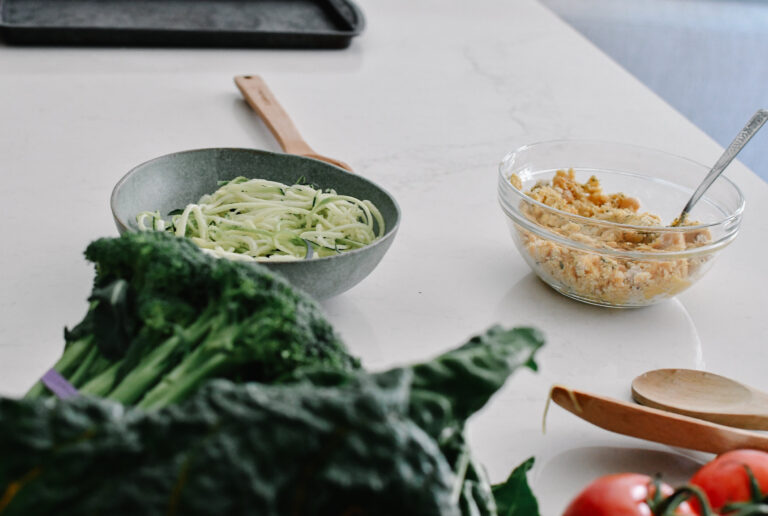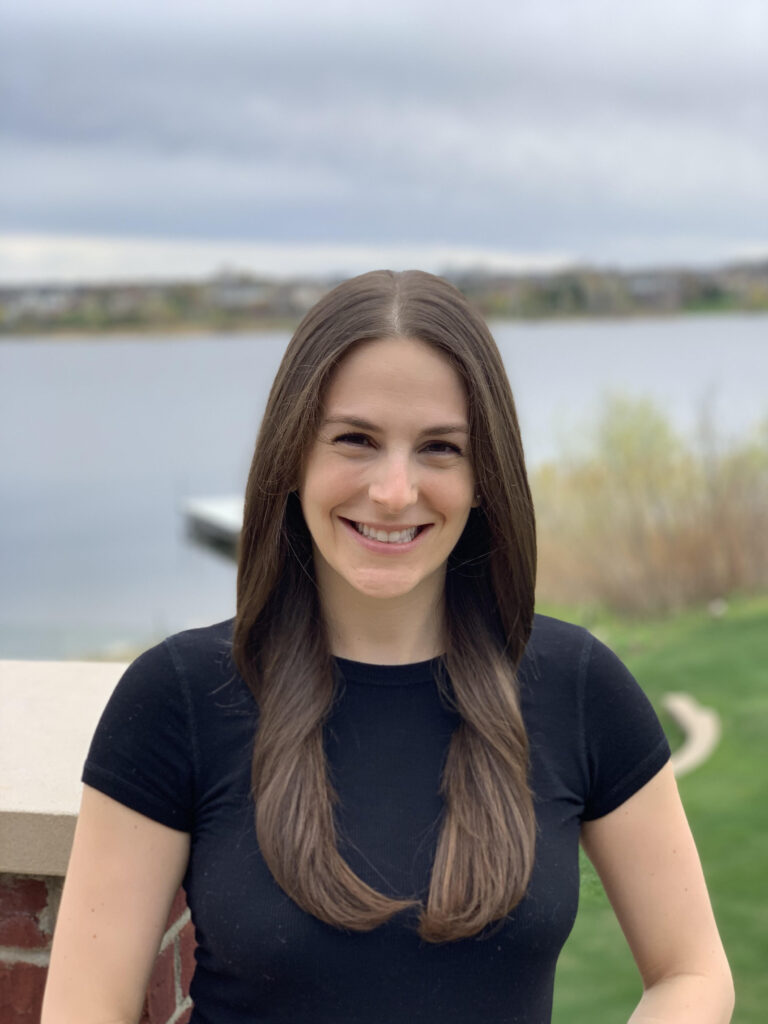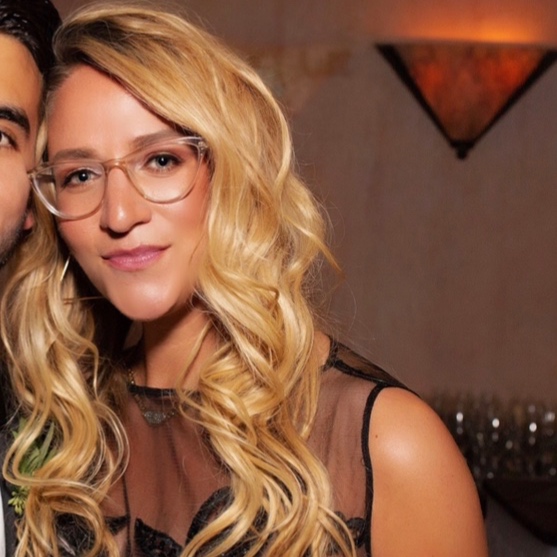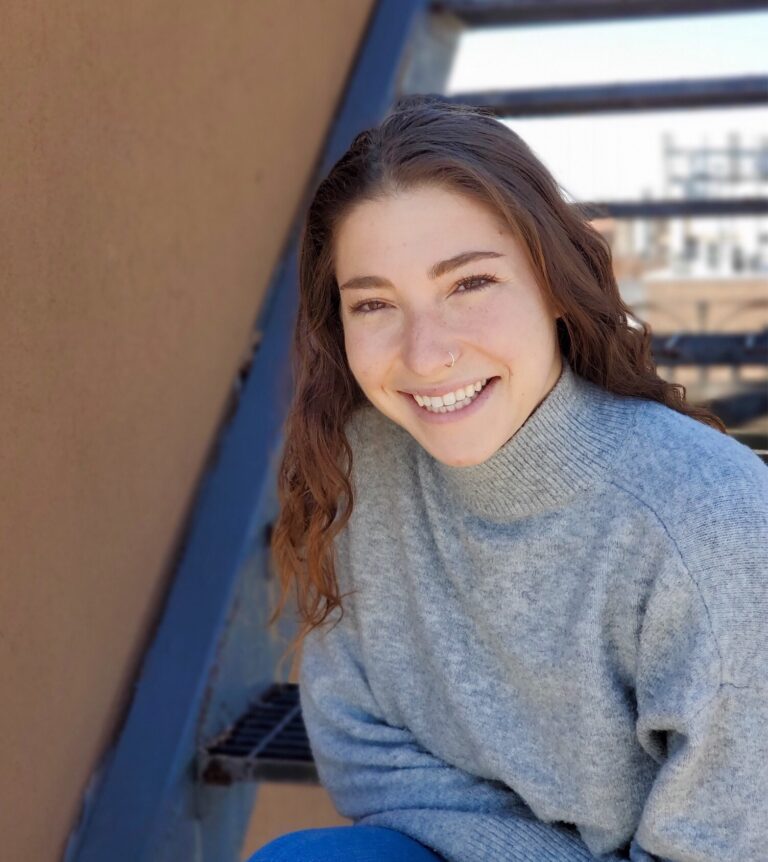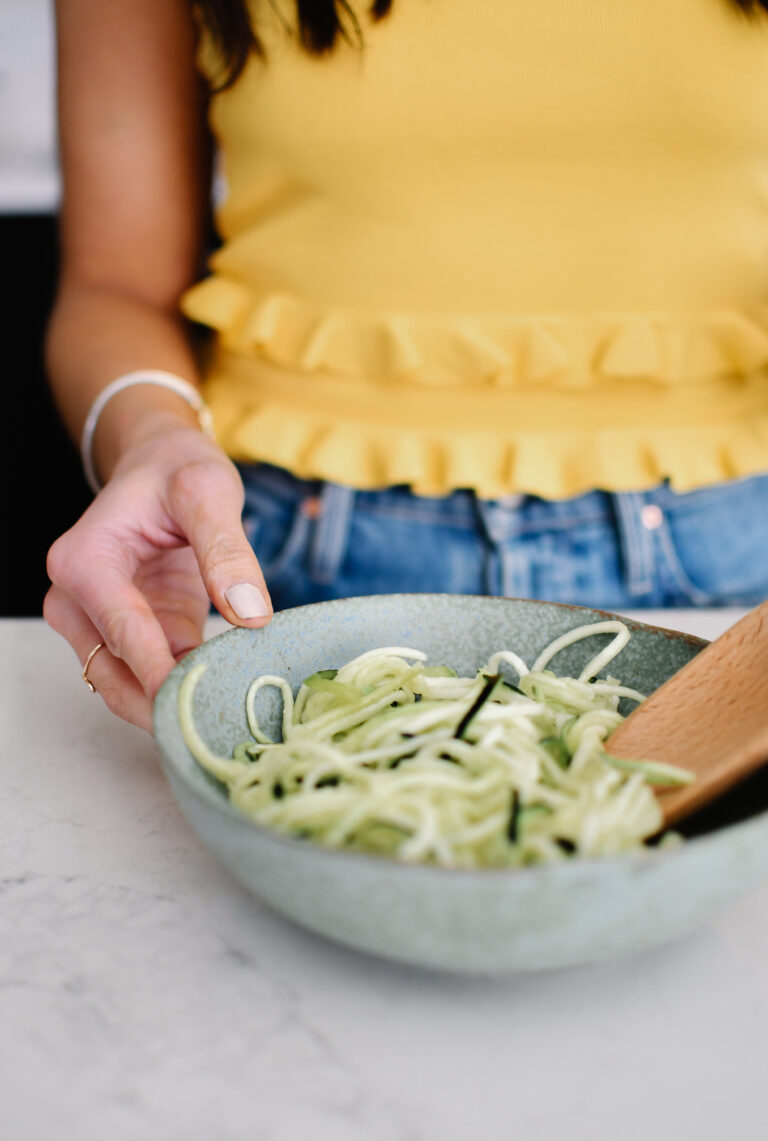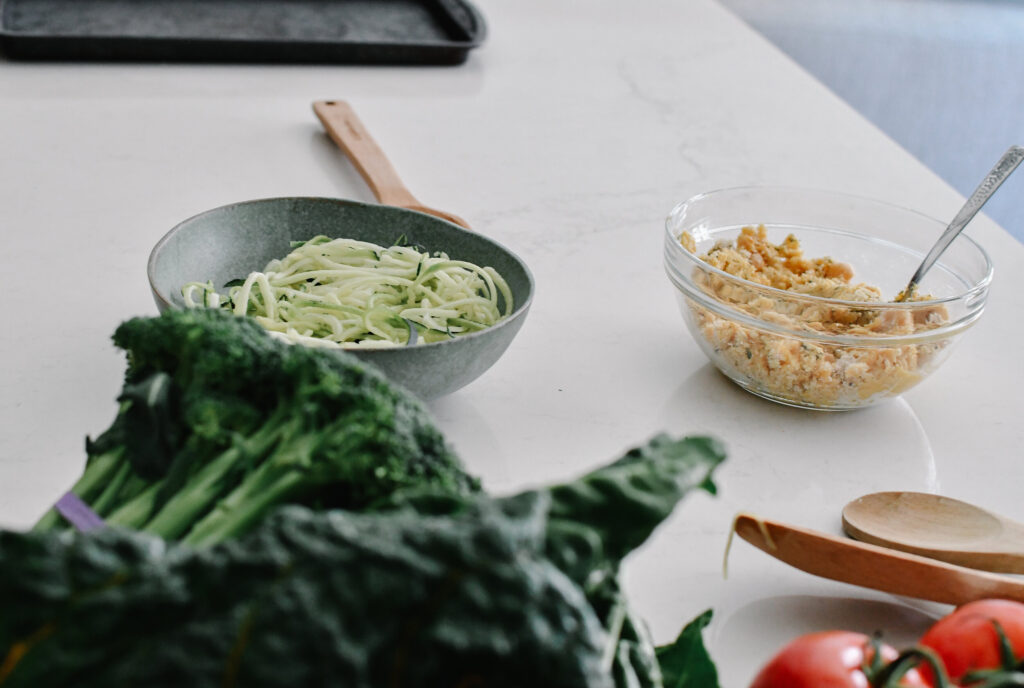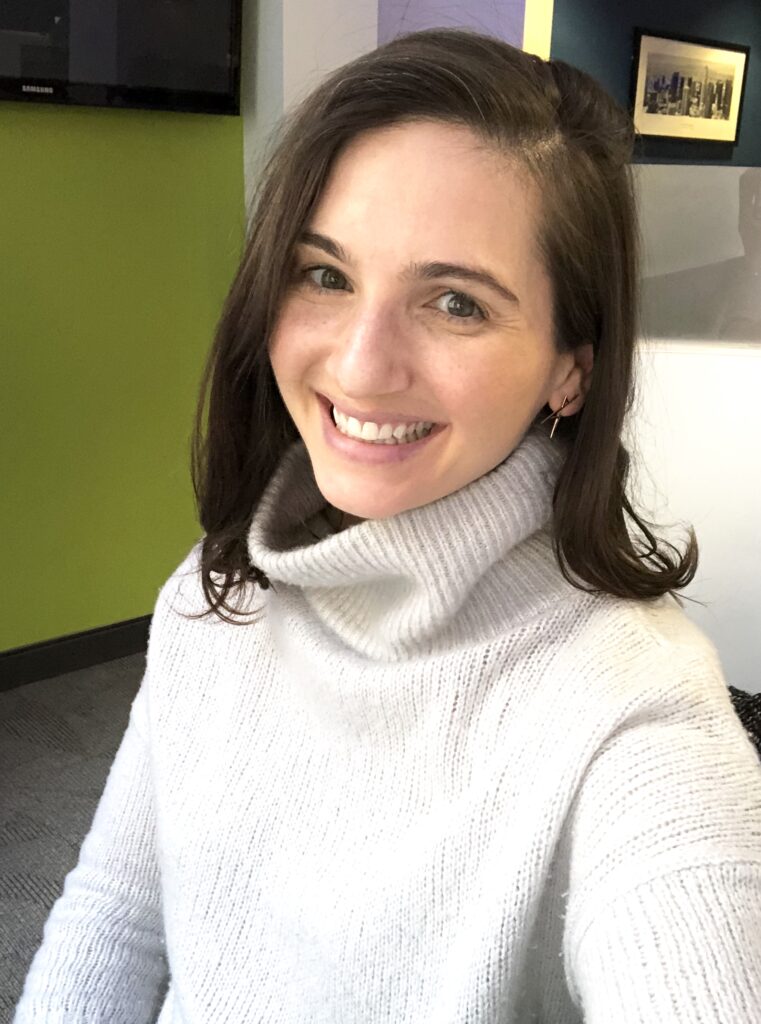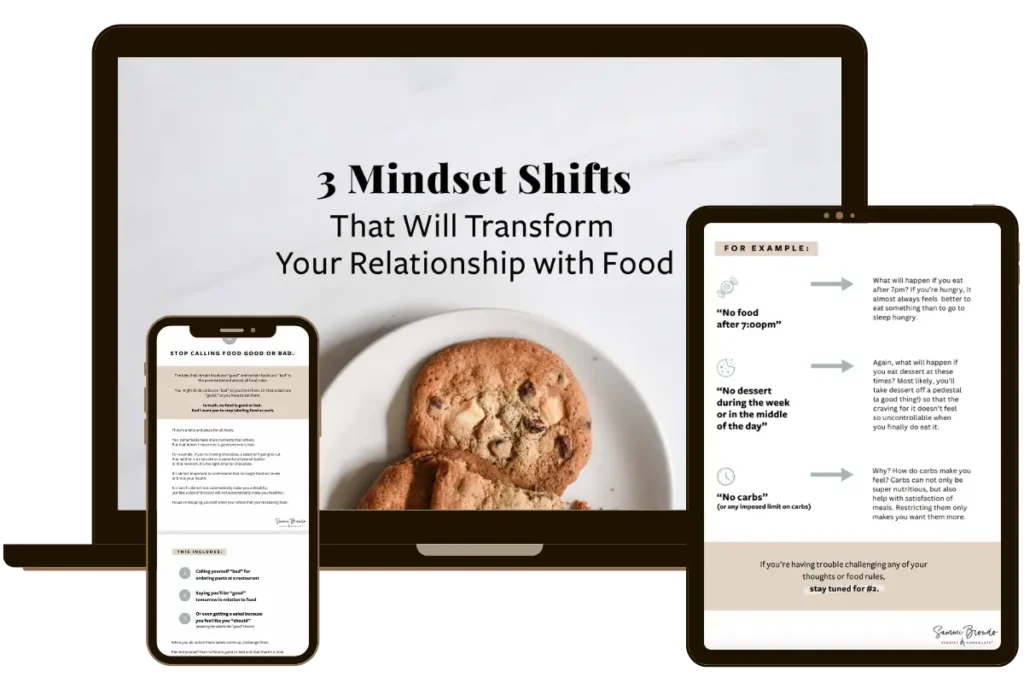Becoming a Registered Dietitian: How To, Pros, Cons and Everything in Between
By Sammi Brondo — July 29, 2024

I get a ton of emails and questions every week about becoming a dietitian: how to become one, pros and cons of the profession, advice for potential students, and so on. So I finally realized, what better way to lay everything out on the table than with an all-encompassing blog post. Below, the most common questions I receive about my job, nutrition, and becoming a dietitian.
To start – a quick briefing on the difference a registered dietitian and a nutritionist. I know that this topic has been written about to exhaustion but, because I still get those occasional questions asking which one I am, it can never hurt to explain what these mean juuust one more time.
What’s the difference between a nutritionist and registered dietitian?
A registered dietitian (RD) is someone who’s completed nutrition coursework, done hands on training in a hospital during a dietetic internship, and passed the RD exam. RD’s have extensive knowledge about not only food, but also the anatomy of the body, metabolism and the scientific ways each specific nutrient works, and how different diseases are both related to and managed with proper nutrition.
On the other hand, anyone can call themselves a nutritionist.
There are no guidelines for the label “nutritionist”– it has no set definition, and there are no requirements to becoming one. Technically, anyone can refer to themselves as a nutritionist. (Please keep in mind that I am NOT saying nutritionists aren’t qualified – many are! And have different types of degrees in nutrition. It’s simply a variable term).
For that reason, all registered dietitians are nutritionists, but not all nutritionists are registered dietitians. I’ll often tell people that I’m a nutritionist to keep things simple, but I’m a registered dietitian as well.
To make matters even more complicated, the Academy of Nutrition and Dietetics recognized the nutritionist/RD confusion in 2013, and added a new credential: registered dietitian nutritionist (RDN). You might see some dietitians refer to themselves as RDN’s – this is the same as an RD. The choice to go by RD or RDN is entirely up to the practitioner.
How did you get into nutrition? Did you study nutrition in undergrad?
I did not study nutrition in undergrad. In fact at the time, my school – the University of Michigan – didn’t even have a nutrition program. Because I always knew I wanted a career that allowed me to help people, I majored in psychology. While applying to graduate school, I actually applied to programs in both nutrition and psychology. I ultimately decided that I was most passionate about nutrition, and that becoming a dietitian would still enable me to put my counseling skills to use to help people, only with a specific focus on food and eating behaviors. (A little FYI – I still consider my Bachelor’s degree and foundation in psychology extremely helpful as dietitian. A lot of RD’s major in psychology as undergrads!).
Once I knew that I wanted to go into nutrition, I applied to New York University’s nutrition program. NYU is one of the only programs that allows students who didn’t study nutrition in undergrad to take the necessary prerequisite courses as graduate students.
What do you need to become a dietitian? Specifically, what did you do?
Whenever I get emailed this question, I end up sending an overly long email response back (whoops). So, I broke this one down into steps for clarity. It’s long (but it’s a long process!).
Step 1: DPD Courses
First – prerequisite nutrition courses, also known as a Didactic Program in Dietetics, or DPD courses. If you study nutrition as an undergrad, you’ll probably complete these in college. If not (like me), keep reading!
Immediately after college, I started taking my DPD courses as NYU. This included classes like chemistry (biochem and organic chem), physiology, food sciences, and counseling courses. The sciences were tough – but all catered to nutrition students (i.e., the molecular structure behind different vitamins!). If you’re truly interested in nutrition, I have no doubt you’ll nerd out over this stuff and enjoy these classes as much I did. Taking as many classes as I could each semester and during summer term, completing my DPD courses took about 2 years.

My friend Sam and I put our orgo notes anywhere we could to help study them (here, as my phone background). We were COMMITTED.
Step 2: Dietetic Internship
After completing DPD courses, you’re eligible to apply for a dietetic internship (DI). You must complete a DI to then take the RD exam.
The DI application and assignment process is similar to the way doctors choose their residency. It’s a matching process, where you select and rank programs, and they select you and rank you (honestly, it’s as intimidating as it sounds!). I was matched to the James J. Peters Bronx VA dietetic internship – more about this specific DI further down for those interested. In general, all DI’s are in a hospital and require 1,200 supervised practice hours. Most are about 1 year long in total.
(Bonus question: was the internship hard?) Yes, it was incredibly hard. There’s no sugar coating this one! I was always doing internship homework, or school work, or physically in the hospital. It’s a difficult year but truly best prepares you for your career to come.
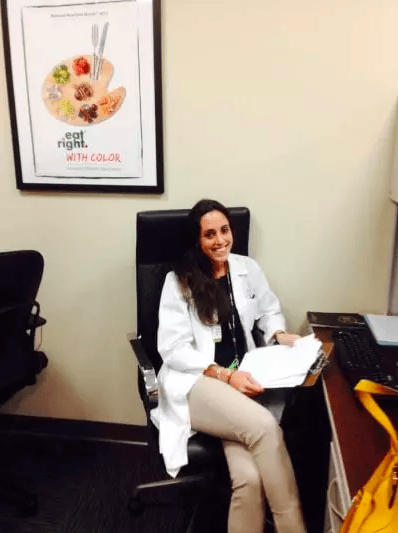
Hard at work during my internship, obviously.
Step 3: RD Exam
Once you’ve finished your DI, you’re eligible to take the RD exam. Good news (!), this is by no means a grueling exam. Get Jean Inman’s study guide – I don’t know anyone who didn’t use it. I studied for 1 month immediately after finishing my DI and passed. Some people study for a bit longer, or you can also choose to study less – you can take the test whenever you like (it’s offered pretty much every day), so it’s totally up to you and what works best for you. Results are given immediately after finishing the test (woohoo!).
Step 4: Master’s degree
My steps were a bit mixed because of my internship (see below), but after completing my internship, I finished my Master’s degree in Clinical Nutrition at NYU. I only had one semester left, and was able to begin working part time as well while finishing the degree.
Master’s classes are fun because you get to learn things like the pathways of different vitamins and minerals in the body, re-visit the Kreb’s cycle, and delve deeper into other nutrition-related topics that interest you. (Seriously, you’ll know you’re in the right field if you also find the aforementioned “fun.”)
A Master’s degree is not necessary to be an RD, but keep in mind that in a competitive and ever growing field, it definitely helps to have one. That, and by 2024 all RD’s will actually be required by the Academy to have a graduate degree.
Done! After all that, you can officially add MS, RD (/RDN) add the end of your name. You’ll never feel so proud of 4 little letters!
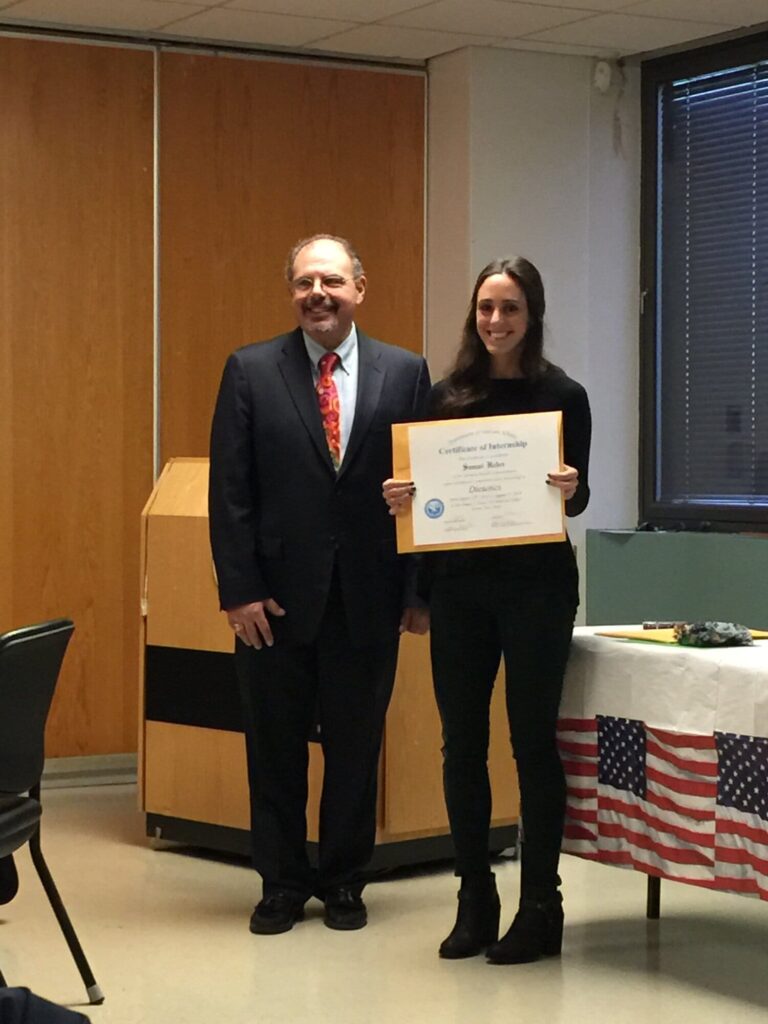
Best. Feeling. Ever.
Did you the like the Bronx VA internship?
Yes! While it was an extremely hard year, I’m forever grateful for this internship. Here’s what it entails: 1 full year in a hospital (vs. others that only offer 6 months), a Master’s degree from NYU, and both inpatient and outpatient rotations. Some people like being in the hospital for less time (meaning more coursework the rest of the time) – personally, I think hands on training and experience is the best way to learn, and enjoyed being able to do so for 1 full year in my internship. But again, totally personal preference. Also, unlike most other internships which only offer inpatient experience, the Bronx VA DI also has outpatient counseling rotations – providing invaluable counseling experience. The ability to work with patients during my DI in a supervised outpatient, counseling setting no doubt helped me learn skills for my private practice today.
The final bonus of the Bronx VA internship is that it goes hand in hand with NYU’s Master’s program. Most students who apply to the Bronx VA have to also be accepted and enroll at NYU to complete their Master’s degree. Because I was already a grad student at NYU before starting my internship, I lucked out. I was able to start taking a few Master’s classes before even starting my internship. Also, because I was then taking Master’s classes during my internship, this also helped me to finish school a little earlier. All in all, from DPD’s to RD exam and Master’s degree, I was able to complete a program that should’ve taken (at least) 4 years in 3 and a half years. (Like I said, #grateful).
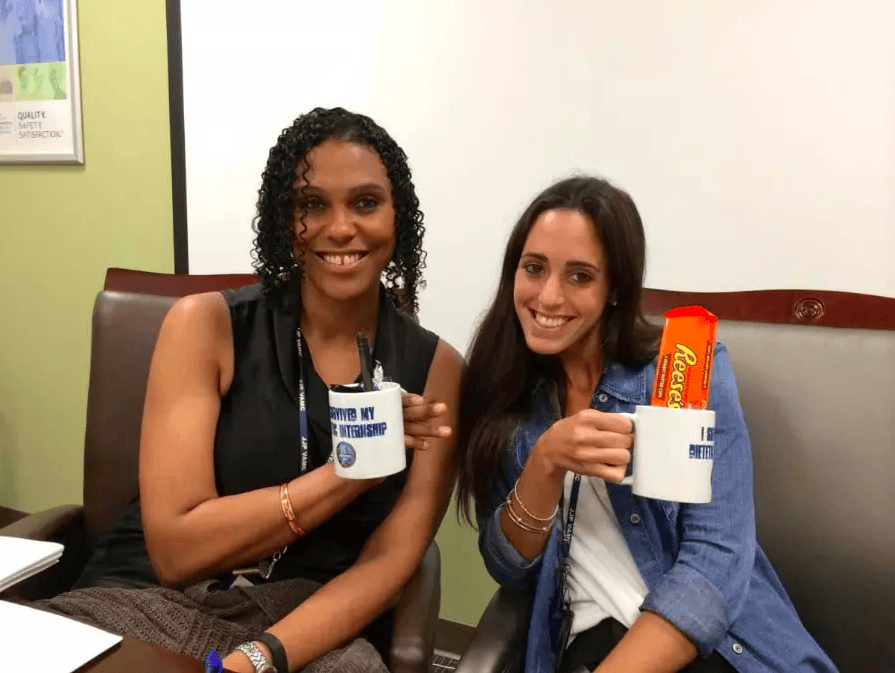
The mugs say “I survived my dietetic internship.” Accurate. With my internship bestie, Dja-maa.
What are the biggest pros and cons of working in nutrition?
Pros: This is the best field (lol not biased at all). There’s so much you can do in nutrition, and the field is growing more every day. You can work in a hospital, work in private practice, work with food companies and so much more. RD’s don’t need to hold traditional 9-5 jobs; in fact, many do a variety of different jobs each day, which is part of what keeps it so fun and interesting.
It’s also an incredibly rewarding field. As a nutrition student, you’ll learn that nutrition is so much more than just weight loss. Proper nutrition can help prevent diabetes, lower cholesterol, protect against heart disease, fuel for athletic activity and more. Nutrition includes eating behaviors, relationships with food, and body image. Food is a tricky thing that nearly everyone has some sort of struggle with. It’s inspiring to have the option to help with so many different aspects of nutrition.
Cons: While there’s so much you can do, it also isn’t easy. For me, building a private practice and social media presence took serious work. And not just like, “oh, that was a hard week.” It’s taken years of hard work to build to what it is now, and still is building every day. But, if the biggest con to being a dietitian is putting in hard work, I’d say we’ve got it pretty good.
What advice would you give to nutrition students/potential applicants/RD-to-be’s?
Get experience and network! As a student, I got involved with a ton of different volunteer opportunities in order to learn about nutrition and broaden my experience. Find opportunities you’d love, and seek them out. And, even if you end up not loving an experience, it will help to show you what types of careers and parts of nutrition you do love. While in school, I volunteered teaching nutrition to charter school students, was a research assistant to one of my professors, interned at multiple private practices and volunteered at a hospital. I enjoyed and learned from each of these experiences and most importantly, keep in touch with nearly everyone I once worked for, who are now my colleagues, mentors, and friends.
With that in mind, networking is one of the most important things you can do – from day one as a nutrition student, ongoing throughout your career. Jennifer McGurk, RDN, CDN, CDE, CEDRD wrote Pursuing Private Practice (and now has an entire e-course about it where you receive the books as a bonus – highly recommend!) in which she mentioned one of my favorite points: you are not in direct competition with other dietitians. In a highly saturated field, it’s so important to remember that other dietitians are not your competition – they’re your support system. If someone comes to me for help with something I don’t work with (i.e., food allergies), I immediately have a list of dietitians/friends who I’d recommend in a heartbeat. Additionally, my nutrition friends have given me invaluable advice to get through the hardest days of my internship and to help starting a private practice. Some of my nutrition mentors have walked me through difficult client choices and career decisions. And, on the other side, I would give any of these people advice, help, and client referrals in an instant. Always remember that you are never in direct competition with anyone, and the more you build a network of nutrition friends and dietitians that you’re willing to support, the more support you’ll have for yourself, too.
Oh, and please respond to emails. It drives me nuts when people reach out to me for advice and then don’t respond to say “thank you” or even just “I thought your email sucked but I did receive it” (kidding, don’t say the second one).
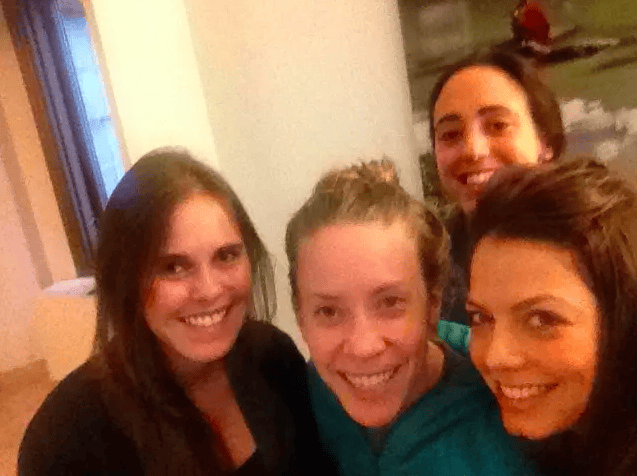
Grad school friends that are still close (now dietitian) friends today. Our selfie skills need work.
I know that doesn’t touch on nearly everything but honestly, I could go on forever. Hopefully this gives a helpful glimpse into the life of and becoming a dietitian. If you want more info on some of the programs and concepts I mentioned, I linked their websites above. And as always, if you have more questions, comment below or send me an email.
xoxo, Sammi

